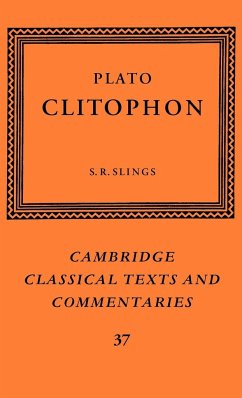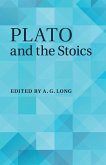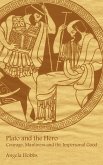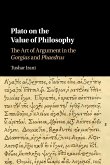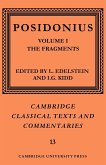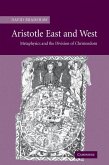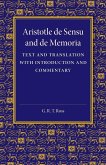- Gebundenes Buch
- Merkliste
- Auf die Merkliste
- Bewerten Bewerten
- Teilen
- Produkt teilen
- Produkterinnerung
- Produkterinnerung
A text with translation, introduction and commentary of a dialogue ascribed to Plato.
Andere Kunden interessierten sich auch für
![Plato and the Stoics Plato and the Stoics]() Plato and the Stoics30,99 €
Plato and the Stoics30,99 €![Plato and the Hero Plato and the Hero]() Angela HobbsPlato and the Hero91,99 €
Angela HobbsPlato and the Hero91,99 €![Plato on the Value of Philosophy Plato on the Value of Philosophy]() Tushar IraniPlato on the Value of Philosophy30,99 €
Tushar IraniPlato on the Value of Philosophy30,99 €![Posidonius Posidonius]() PosidoniusPosidonius70,99 €
PosidoniusPosidonius70,99 €![Aristotle East and West Aristotle East and West]() David Etc BradshawAristotle East and West48,99 €
David Etc BradshawAristotle East and West48,99 €![de Sensu and de Memoria de Sensu and de Memoria]() Aristotlede Sensu and de Memoria41,99 €
Aristotlede Sensu and de Memoria41,99 €![Aristotle's Ethics and Moral Responsibility Aristotle's Ethics and Moral Responsibility]() Javier EcheñiqueAristotle's Ethics and Moral Responsibility31,99 €
Javier EcheñiqueAristotle's Ethics and Moral Responsibility31,99 €-
-
-
A text with translation, introduction and commentary of a dialogue ascribed to Plato.
Hinweis: Dieser Artikel kann nur an eine deutsche Lieferadresse ausgeliefert werden.
Hinweis: Dieser Artikel kann nur an eine deutsche Lieferadresse ausgeliefert werden.
Produktdetails
- Produktdetails
- Verlag: Cambridge University Press
- Seitenzahl: 380
- Erscheinungstermin: 12. Januar 2011
- Englisch
- Abmessung: 222mm x 145mm x 26mm
- Gewicht: 666g
- ISBN-13: 9780521623681
- ISBN-10: 0521623685
- Artikelnr.: 21988898
- Herstellerkennzeichnung
- Libri GmbH
- Europaallee 1
- 36244 Bad Hersfeld
- gpsr@libri.de
- Verlag: Cambridge University Press
- Seitenzahl: 380
- Erscheinungstermin: 12. Januar 2011
- Englisch
- Abmessung: 222mm x 145mm x 26mm
- Gewicht: 666g
- ISBN-13: 9780521623681
- ISBN-10: 0521623685
- Artikelnr.: 21988898
- Herstellerkennzeichnung
- Libri GmbH
- Europaallee 1
- 36244 Bad Hersfeld
- gpsr@libri.de
Plato (428/427 or 424/423 - 348/347 BC) was an Athenian philosopher during the Classical period in Ancient Greece, founder of the Platonist school of thought, and the Academy, the first institution of higher learning in the Western world. He is widely considered the pivotal figure in the history of Ancient Greek and Western philosophy, along with his teacher, Socrates, and his most famous student, Aristotle.[a] Plato has also often been cited as one of the founders of Western religion and spirituality.[4] The so-called Neoplatonism of philosophers like Plotinus and Porphyry influenced Saint Augustine and thus Christianity. Alfred North Whitehead once noted: "the safest general characterization of the European philosophical tradition is that it consists of a series of footnotes to Plato."[5] Plato was the innovator of the written dialogue and dialectic forms in philosophy. Plato is also considered the founder of Western political philosophy. His most famous contribution is the theory of Forms known by pure reason, in which Plato presents a solution to the problem of universals known as Platonism (also ambiguously called either Platonic realism or Platonic idealism). He is also the namesake of Platonic love and the Platonic solids. His own most decisive philosophical influences are usually thought to have been along with Socrates, the pre-Socratics Pythagoras, Heraclitus and Parmenides, although few of his predecessors' works remain extant and much of what we know about these figures today derives from Plato himself.[b] Unlike the work of nearly all of his contemporaries, Plato's entire body of work is believed to have survived intact for over 2,400 years.[7] Although their popularity has fluctuated over the years, the works of Plato have never been without readers since the time they were written
Preface
Abbreviations
Introduction
Part I. Prolegomena to the Dialogue: 1. Introduction
2. Summary and analysis of composition
3. Is the Clitophon unfinished?
4. The Clitophon as a Short Dialogue
5. The characters of the dialogue
Part II. Meaning and Authenticity: 6. Philosophical protreptic in the fourth century BCE
7. Protreptic in the Clitophon
8. Protreptic in Plato
9. Elenchos in the Clitophon
10. Justice in the Clitophon
11. The meaning of the Clitophon
12. Date and authenticity
Text and translation
Commentary
Appendices: I. The ending of Aristotle's Protrepticus
II. Note on the text
Bibliography
Indexes.
Abbreviations
Introduction
Part I. Prolegomena to the Dialogue: 1. Introduction
2. Summary and analysis of composition
3. Is the Clitophon unfinished?
4. The Clitophon as a Short Dialogue
5. The characters of the dialogue
Part II. Meaning and Authenticity: 6. Philosophical protreptic in the fourth century BCE
7. Protreptic in the Clitophon
8. Protreptic in Plato
9. Elenchos in the Clitophon
10. Justice in the Clitophon
11. The meaning of the Clitophon
12. Date and authenticity
Text and translation
Commentary
Appendices: I. The ending of Aristotle's Protrepticus
II. Note on the text
Bibliography
Indexes.
Preface
Abbreviations
Introduction
Part I. Prolegomena to the Dialogue: 1. Introduction
2. Summary and analysis of composition
3. Is the Clitophon unfinished?
4. The Clitophon as a Short Dialogue
5. The characters of the dialogue
Part II. Meaning and Authenticity: 6. Philosophical protreptic in the fourth century BCE
7. Protreptic in the Clitophon
8. Protreptic in Plato
9. Elenchos in the Clitophon
10. Justice in the Clitophon
11. The meaning of the Clitophon
12. Date and authenticity
Text and translation
Commentary
Appendices: I. The ending of Aristotle's Protrepticus
II. Note on the text
Bibliography
Indexes.
Abbreviations
Introduction
Part I. Prolegomena to the Dialogue: 1. Introduction
2. Summary and analysis of composition
3. Is the Clitophon unfinished?
4. The Clitophon as a Short Dialogue
5. The characters of the dialogue
Part II. Meaning and Authenticity: 6. Philosophical protreptic in the fourth century BCE
7. Protreptic in the Clitophon
8. Protreptic in Plato
9. Elenchos in the Clitophon
10. Justice in the Clitophon
11. The meaning of the Clitophon
12. Date and authenticity
Text and translation
Commentary
Appendices: I. The ending of Aristotle's Protrepticus
II. Note on the text
Bibliography
Indexes.

